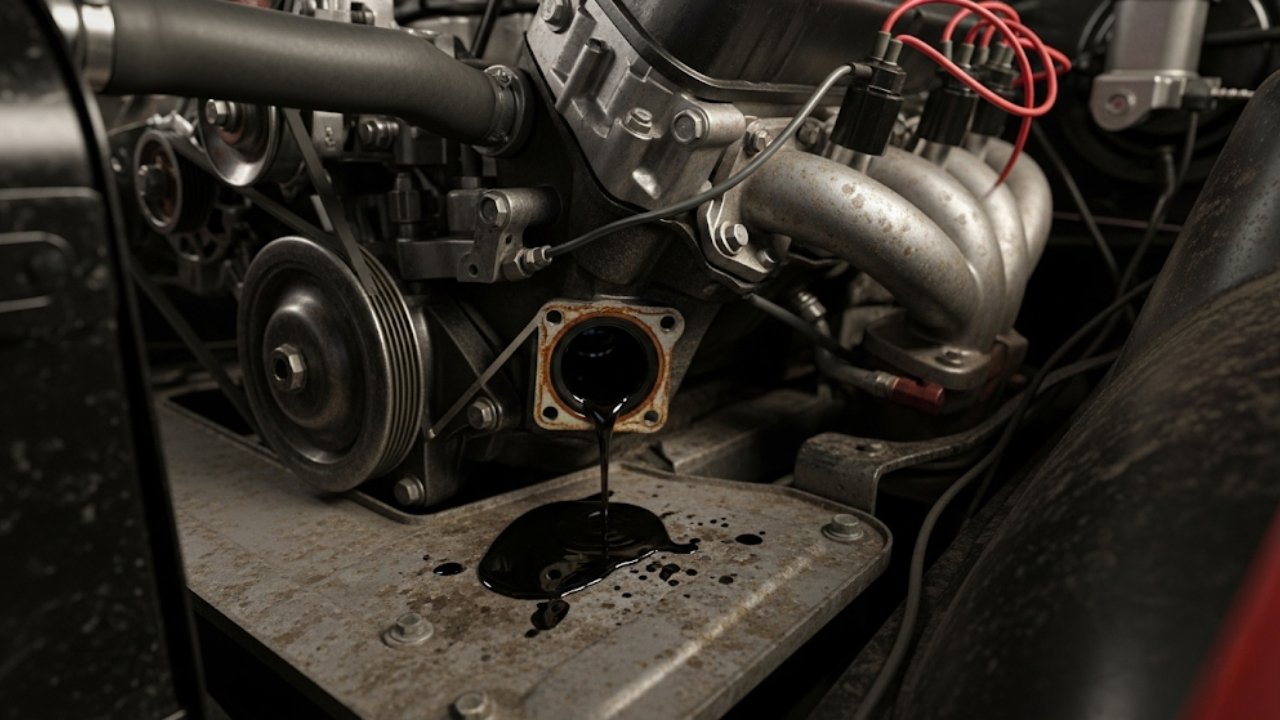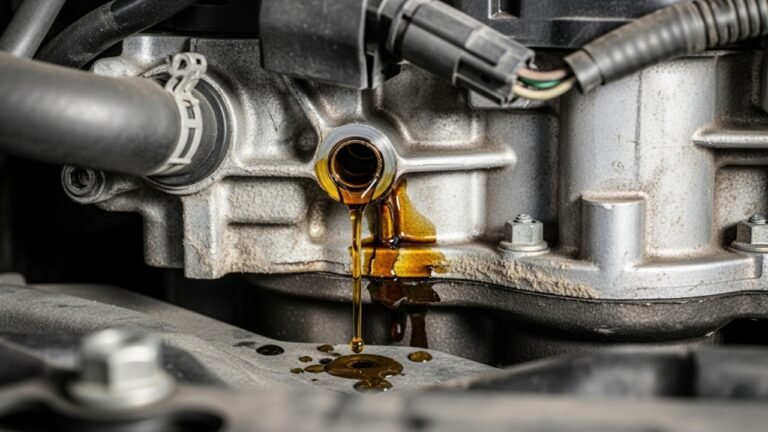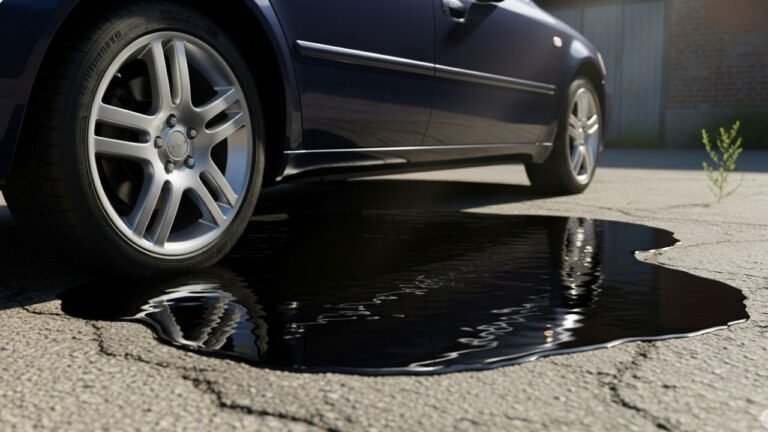Why Does My Car Smell Like Oil?

Have you ever walked up to your car and caught a strong oil smell? You pause. You sniff again. It’s not the usual morning breeze or even the scent of fuel—it’s that burnt, greasy, slightly mechanical odor you can’t ignore. That oil smell from car could mean something minor—or something serious.
You’re not alone. Many drivers have gone through this, and the reasons are more common than you think. In this guide, I’ll walk you through why this happens, what it might mean, and how you can fix it before it turns into a costly mess.
We’ll also dive into real stories and personal reflections—because sometimes, the warning signs are more about intuition than diagnostics.
In This Article
- 1 The First Time I Smelled Oil in My Car: A Personal Note
- 2 What Does the Oil Smell from Car Mean?
- 3 Oil Leak on Hot Engine: The Classic Culprit
- 4 Spilled Oil from a Recent Change
- 5 Bad Valve Cover Gasket
- 6 Clogged PCV Valve
- 7 Table: Quick Comparison of Common Oil Smell Causes
- 8 Is It Just an Oil Smell or Something Worse?
- 9 Trust Your Nose, Trust Your Gut
- 10 Burning Oil Due to Engine Wear
- 11 ️ Exhaust System Leaks: Oil Meets Heat
- 12 Cabin Filter and Vent Contamination
- 13 DIY or Mechanic? What You Can Fix Yourself
- 14 How to Prevent Oil Smells in the Future
- 15 ♂️ FAQs About Oil Smell from Car
- 15.1 1. Why does my car smell like burning oil after a long drive?
- 15.2 2. Is it safe to drive with an oil smell from car?
- 15.3 3. Can the smell of oil mean low oil levels?
- 15.4 4. What does burning oil smell like?
- 15.5 5. How do I get rid of the oil smell from my car’s interior?
- 15.6 6. Can a clogged oil filter cause a burning smell?
- 15.7 7. Is blue smoke always a sign of oil burning?
- 15.8 8. Can synthetic oil cause a stronger smell?
- 16 Final Thoughts: Let Your Nose Guide You
The First Time I Smelled Oil in My Car: A Personal Note

At first, I shrugged it off. But the next day, the smell was stronger—and that’s when I knew: something wasn’t right.
That personal experience led me down the rabbit hole of learning more than I ever thought I would about car maintenance. Now, I want to share that journey with you, with facts, empathy, and some light storytelling.
What Does the Oil Smell from Car Mean?
The oil smell from car isn’t just a nuisance—it’s a message. Your vehicle is trying to tell you something. It could be a small leak, a loose cap, or even a bigger issue like a failed gasket.
Here’s what it might mean when your car smells like oil:
➤ Possible Reasons:
-
Oil Leak onto a Hot Engine Surface
-
Spilled Oil from a Recent Oil Change
-
Damaged Valve Cover Gasket
-
Clogged PCV Valve (Positive Crankcase Ventilation)
-
Burning Oil Due to Engine Wear
-
Exhaust Leak
-
Worn Piston Rings or Seals
Let’s break these down one by one.
Oil Leak on Hot Engine: The Classic Culprit
One of the most common reasons for the oil smell from car is when oil leaks onto a hot engine part like the exhaust manifold. When this happens, the oil sizzles like butter in a frying pan, producing that unmistakable scent.
Even a small leak can create a strong smell. The scary part? Many drivers won’t see oil on the ground because it’s burning off before it hits the pavement.
Signs to Watch:
-
Smell intensifies after driving for a while
-
Smoke coming from under the hood
-
A thin haze inside the cabin
-
Oil level dropping slowly over time
Tip: Pop the hood (when cool!) and check for wet, dark areas around the valve cover or engine block. A flashlight helps.
Spilled Oil from a Recent Change
Let’s be honest—not all mechanics are careful. And sometimes, we do it ourselves and forget to clean up. If oil spills during an oil change and isn’t wiped away, it may cling to engine parts.
When the engine heats up, the burnt oil smell starts creeping in through the vents. This is temporary but can be alarming if you don’t expect it.
What to Do:
-
Wait a few days to see if the smell fades
-
Clean the engine with a degreaser or take it to a car wash
-
Double-check your oil filter and cap for tightness
Sometimes, the simplest answer is the right one.
Bad Valve Cover Gasket
The valve cover gasket seals the top of your engine. When it wears out or cracks, oil leaks out, especially when your car is running hot. That oil can drip right onto hot surfaces.
This is a very common cause of the oil smell from car, especially in older vehicles or those with over 100,000 miles.
⚠ Warning Signs:
-
Engine misfires
-
Visible oil around the edges of the valve cover
-
Increased oil consumption
-
Smell intensifies in stop-and-go traffic
If you ignore it, the leak gets worse and could damage engine parts. It’s best to replace the gasket early—it’s a relatively inexpensive fix.
Clogged PCV Valve
The PCV valve helps manage pressure and gasses in your engine. When it gets clogged, oil vapor escapes through other routes. This can lead to a burnt smell, especially under the hood.
A faulty PCV system can also lead to sludge buildup in the engine. Think of it as your engine’s breathing system—if it can’t exhale, it chokes.
Symptoms of a Clogged PCV Valve:
-
Smell of burning oil
-
Rough idling
-
Engine knocking or pinging
-
Poor fuel economy
Replacing this valve is usually cheap and easy. Don’t ignore the signs—it can save your engine long-term.
Table: Quick Comparison of Common Oil Smell Causes
| Cause | Smell Present When? | Danger Level | Fix Cost |
|---|---|---|---|
| Oil Leak on Engine | After driving 5–15 mins | High | $100–$400 |
| Spilled Oil | Right after oil change | Low | Free–$50 |
| Valve Cover Gasket | During idle or acceleration | Medium–High | $150–$500 |
| Clogged PCV Valve | At idle or full throttle | Medium | $50–$150 |
| Worn Engine Seals | Constant smell + smoke | High | $500–$2,000+ |
Is It Just an Oil Smell or Something Worse?
Not every oil smell from car is just about oil. Sometimes, it’s a combination of oil and coolant, or oil and burning plastic. That’s when things get tricky.
Ask yourself:
-
Is there white smoke from the exhaust?
-
Is the engine temperature rising?
-
Are there weird noises?
These are red flags that it’s more than just oil. You could be looking at a blown head gasket, a cracked oil pan, or something worse.
Rule of Thumb: If the smell is constant, strong, and paired with other symptoms—get it checked right away.
Trust Your Nose, Trust Your Gut
Funny thing about cars—they often tell you what’s wrong before they break down. All you have to do is listen—and sniff.
The oil smell from car is like a whisper. It’s not screaming at you (yet), but it’s definitely speaking. Don’t ignore that whisper, because if you do, it’ll start yelling… in the form of repair bills.
Burning Oil Due to Engine Wear
As cars age, parts wear down. It’s natural. One key problem that can arise is engine oil burning inside the combustion chamber. This usually happens when the piston rings or valve seals wear out and let oil slip into the cylinder.
When this happens, the oil doesn’t just burn off on hot engine parts—it gets burned with the fuel-air mixture. That creates a constant oil smell from the car, often paired with blue-gray smoke from the exhaust.
How Can You Tell?
-
Blue smoke from the tailpipe
-
You’re topping off oil often without visible leaks
-
Smell lingers both inside and outside the car
-
Your engine runs rough or misfires occasionally
This kind of issue is serious. It means the engine is literally eating its oil. It can damage your catalytic converter, ruin your MPG, and eventually lead to full engine rebuilds.
️ Exhaust System Leaks: Oil Meets Heat
Here’s one many people overlook: an exhaust leak.
If oil drips onto the exhaust pipe—or if your exhaust manifold is cracked—it creates a sharp, oily, almost metallic smell. The oil smell from car in this case is different: more toxic, like hot asphalt.
Exhaust leaks are dangerous. They can let carbon monoxide and other gases seep into the cabin, and you may feel dizzy or lightheaded after driving. Not good.
Signs of Exhaust Leaks:
-
Ticking sound from the engine bay
-
Poor acceleration or fuel economy
-
Smell gets stronger when you idle or stop
-
You feel drowsy or unwell after long drives
If you suspect this, stop driving and get it checked. Your health comes first.
Cabin Filter and Vent Contamination
Sometimes, the oil smell from car has nothing to do with the engine itself. It could be lingering in your HVAC system, especially if oil or grime made its way into the air intake or cabin filter.
Imagine spilling oil under your hood, and some gets sucked into the cabin air filter. That smell will circulate every time you turn on the AC or heater.
Quick Fix:
-
Replace the cabin air filter (super cheap!)
-
Clean the vents with disinfectant spray
-
Wash the engine bay carefully
This is a good first step before assuming the worst.
DIY or Mechanic? What You Can Fix Yourself
It’s always tempting to fix things yourself. And for some of these issues, you can.
✅ DIY-Friendly Issues:
-
Cleaning up spilled oil
-
Replacing the oil cap
-
Changing the cabin filter
-
Swapping a PCV valve (if accessible)
-
Tightening bolts on the valve cover
Mechanic-Only Problems:
-
Worn piston rings or valve seals
-
Cracked exhaust manifolds
-
Major oil leaks
-
Valve cover gasket replacement (unless you’re confident)
If you’re unsure, get a diagnosis. Some garages will do a check-up for free or low cost.
How to Prevent Oil Smells in the Future
We’ve covered what causes the smell. But let’s talk prevention, so it never comes back.
Tips to Stay Smell-Free:
-
Check your oil every 2 weeks (look for drops or color change)
-
Use OEM gaskets when repairing leaks
-
Never overfill oil—extra oil leads to pressure and leaks
-
Always clean around the oil cap and filter after a change
-
Service your PCV valve every 30,000–50,000 miles
-
Get a mechanic to inspect the valve cover during each oil change
Little steps can save you big money and hassle later.
♂️ FAQs About Oil Smell from Car
1. Why does my car smell like burning oil after a long drive?
It’s likely that oil is leaking onto hot engine parts like the exhaust. This happens more when the car runs long enough to heat everything up.
2. Is it safe to drive with an oil smell from car?
Not always. If it’s from a small spill, it may be fine. But leaks on hot parts can catch fire or damage your engine. Always inspect first.
3. Can the smell of oil mean low oil levels?
Yes. If you smell oil and your engine is burning it or leaking it, chances are your oil level is dropping. Check the dipstick ASAP.
4. What does burning oil smell like?
Burning oil smells like hot metal, grease, and a bit like an engine workshop. It’s sharper than gasoline and can feel thick in the air.
5. How do I get rid of the oil smell from my car’s interior?
Clean your vents, replace the cabin air filter, and make sure there’s no oil in your HVAC intake area. Air fresheners won’t help until the source is gone.
6. Can a clogged oil filter cause a burning smell?
Indirectly, yes. If oil isn’t flowing well, pressure builds, leading to leaks that cause burning smells. Always replace your oil filter with each oil change.
7. Is blue smoke always a sign of oil burning?
Yes, mostly. Blue-gray smoke from the exhaust usually means oil is burning inside your engine. That’s a sign of worn-out engine seals or rings.
8. Can synthetic oil cause a stronger smell?
Not necessarily, but it can have a slightly different scent when it burns. The issue is usually the leak, not the oil type.
Final Thoughts: Let Your Nose Guide You
A car that smells like oil is like a friend who’s trying to tell you something but doesn’t have the words. The oil smell from car is a whisper—sometimes subtle, sometimes strong, always meaningful.
Trust your gut. Trust your nose. Cars, like people, don’t just start acting up without reason.
A small leak now can become an engine failure later. A ten-dollar gasket fix today can save you a two-thousand-dollar repair tomorrow.
Keep your car clean, keep your ears open, and when you catch that smell again—you’ll know what to do.






